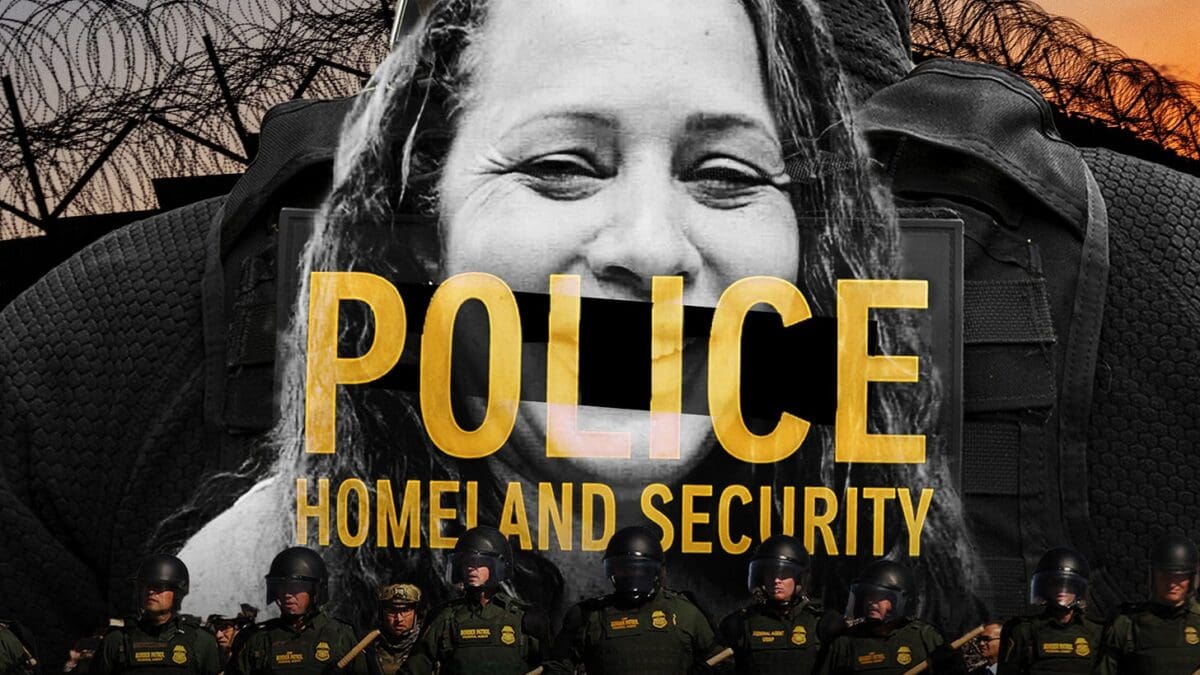
How to leak to a journalist
April 2, 2025
50+ Groups to Schumer: ‘Time to Step Down as Senate Minority Leader’ | Common Dreams
April 2, 2025ON MARCH 27, ICE AGENTS LOADED Adriana Quiroz Zapata on a bus, drove her to Mexico, and tried to dump her on the Mexican authorities. The Mexicans, after hearing Zapata’s story of police corruption, threats, torture, and sexual violence spanning years, refused to accept her. They sent her, the ICE agents, and their bus back across the border.
Zapata’s story is just the latest example of a pattern that has emerged early in the Trump administration’s push for mass deportations: Authorities scrambled haphazardly, accountability and oversight were inconsistent at best, and along the way, they likely violated the law, not to mention the rights of a vulnerable, lawful immigrant who’s been through hell.
Zapata is just one of a growing number who have been caught in the dragnet, but her saga illustrates the human costs of what the administration is doing. Now back in detention in El Paso, where she’s been since August 2024, she’s struggling with hyperthyroidism, hyperlipidemia, and prediabetes.
According to her niece, Monica Van Housen, Zapata never missed a Sunday Mass, and she loves her cat, Preciosa, whom she had to leave behind in Colombia. She’s a fan of vallenato music, is a stickler for cleanliness, and enjoys having her nails done and taking care of her hair.
In 2021, Zapata was in a relationship with Steev Manuel Puello Restrepo whose father, Carlos Puello, is a high-ranking lieutenant in the Colombian national police and a member of a wealthy and influential family, according to immigration court documents. When the couple tried to claim asylum in the United States that year, Restrepo passed the test to establish “credible fear” in his home country and was allowed to enter the United States. Zapata did not, her lawyer, Lauren O’Neal, said. So Zapata was sent back to Colombia while Restrepo remained in the United States.
The following year, Restrepo was renting a room at the home of Zapata’s sister in New Jersey. According to a North Bergen Township police report shared with The Bulwark by a member of Zapata’s family, Restrepo physically attacked Zapata’s sister. Zapata’s niece, who was a witness, reported that he struck her mother so hard that her breast immediately began to bruise. Restrepo denied that he had assaulted Zapata’s sister and called Zapata in Colombia while in the presence of a police officer, presumably so that she would defend him. She instead informed the officer that Restrepo had told her about attacking her sister. Officers placed him under arrest. “This incident,” immigration court records explain, “ultimately led to [Restrepo’s] deportation.” Restrepo told Zapata in a phone call after his arrest that he blamed her and her sister for his deportation, according to immigration court records.
Upon returning to Colombia, Restrepo, backed by what immigration court documents called his father’s “substantial influence on the national police force,” began scheming for revenge against Zapata: “On at least ten different occasions from 2022 to 2024, [Restrepo] and uniformed police officers came to [Zapata’s] home, destroyed her things, threatened her, severely beat her, and raped her.” She tried to report the first attack to police, but they refused to take her report after they heard Restrepo’s name, according to those same documents.
Zapata moved twice within Colombia during that period, including to a location four hours from her home in Medellin. But even though she kept each address private, Zapata found her each time, the immigration judge found in his ruling.
She finally fled for her safety to the United States last August. But fleeing trouble, she soon found more—this time at the hands of U.S. authorities.
ZAPATA WAS IMMEDIATELY DETAINED in El Paso. On December 10, 2024 while still in detention, she signed an untranslated document waiving her right to parole release despite her pending case, according to O’Neal. But she later alleged that agents had coerced her to do so. She and her lawyer subsequently filed a complaint with the Office of the Immigration Detention Ombudsman (OIDO). It was successful, leading to a deportation officer being reassigned; that agent no longer has any interaction with detainees, O’Neal said.
In addition to the OIDO complaint, O’Neal also contacted the office of Rep. Veronica Escobar (D-Texas), who represents El Paso, to help her client’s case. According to O’Neal, after the complaint to OIDO and the outreach to Rep. Escobar, ICE agents in El Paso became more vindictive toward Zapata.
Before the ICE agent was reassigned, he approached her in detention and told her he had ways of keeping her languishing in El Paso for an extra eight to nine months, O’Neal told The Bulwark. After receiving those threats, Zapata filed another OIDO complaint on January 8, which went nowhere.
(The Trump administration gutted OIDO and other offices that were part of civil rights and immigration liaison services on March 21, explaining that “they often function as internal adversaries that slow down operations.”)
ICE El Paso officials did not reply to a request from The Bulwark for comment. A DHS spokesperson responded by asking for a copy of the immigration court ruling documents—but after being provided them did not respond further.
Zapata’s case finally came up for adjudication in February of this year. During the proceedings, Immigration Judge Stephen Ruhle characterized what Zapata had experienced in Colombia during Restrepo’s series of attacks as “extreme physical and sexual abuse,” noting that she had broken teeth and stab wounds, among other injuries. He ruled that the Convention Against Torture prevented her from being deported to Colombia.
After Ruhle’s decision, Zapata’s niece contacted the office of Rep. Rob Menendez (D-N.J.), her representative, seeking help with Zapata’s case, according to O’Neal.
About a month later, ICE officials in El Paso told O’Neal that Mexico had agreed to take Zapata, but that she wouldn’t be sent there anytime soon.
Three days later, ICE agents tried to ship her across the border.
According to asylum law, Zapata can be sent to a country that’s not her native home if that country accepts her and if it is a country where she already has ties. But Zapata has no ties to Mexico, and they did not accept her. O’Neal alleges that agents again coerced Zapata to sign an untranslated voluntary removal document entailing her agreement to be barred from the United States for twenty years.
“What she thought was, either she signs the form or they throw her off the bridge, she doesn’t know what else they could do,” Van Housen told me. “She just thought the worst, honestly—that she could die in their hands.”
If not for a little patience by the Mexican immigration authorities, Zapata might have become an undocumented immigrant in Mexico. At the border, as Mexican authorities asked ICE to return her bag with her passport to her, her niece says Zapata prayed to God and invoked her late mother: “Whatever happens, Mom, please help me.” That’s when Mexican officials called Mexican immigration authorities. When ICE returned with Zapata’s belongings, those officials said she was not going to be allowed in.
In a recorded phone call that O’Neal provided to The Bulwark, the Instituto Nacional de Migración, which controls migration into Mexico, confirmed it did not have information in its system on accepting Zapata, in apparent contradiction to what O’Neal said the official in the ICE field office had claimed.
ZAPATA, NOW 53, REMAINS IN A DETENTION CENTER in El Paso. Van Housen said her aunt is nervous, and that she has diarrhea and is vomiting because she doesn’t know what’s going to happen to her. She says Zapata’s toenails are turning black, and one of her teeth is chipped and turning brown.
“To tell you the truth, I have no words to explain how mentally and physically sick she is,” Van Housen said.
O’Neal said she believes ICE was taking an unusually vindictive approach toward Zapata even before Trump came to power, but that his presidency has allowed the agency to drop any pretense of trying to follow the law. “They were going to be retaliatory to Adriana regardless, but Trump coming in made it a lot easier for them,” she said. “They’ve essentially been instructed to see what they can get away with, and they’re retaliating over us trying to keep them accountable. They don’t like to be accountable.”
Trump campaigned on mass deportations, and has reportedly been frustrated with the pace at which people are being removed from the country. In the scramble to get people out, the administration has trampled previously ironclad laws and regulations, profiling people based on flimsy tattoo criteria, lying about Americans’ criminal records, deporting American citizens, and sending people to an inhumane foreign prison without due process. The administration has also launched a legal assault on birthright citizenship.
ICE El Paso, O’Neal stressed, has long been at the forefront of efforts to push the boundaries of immigration laws and detention treatment.
In 2023, NPR reported that a pregnant woman held in El Paso had abdominal pain after falling in the shower but was not given “an ultrasound to rule out an ectopic pregnancy.” In 2020, at the height of the pandemic, six asylum seekers detained at the same El Paso facility sued ICE for their release, saying the center wasn’t doing enough to protect them. A 25-year-old former law student from Guatemala alleged in the suit that she had coughed up blood and wasn’t tested for COVID at the center, despite eleven other women showing symptoms.
O’Neal describes similar conditions at the detention center where Zapata is being held. She said there are just four showers for 160 women, and agents taunt detainees with insults like “Go back to your country.”
Now O’Neal is planning to file a habeas petition in Texas to get the federal judiciary to review Zapata’s case, which could result in an order for her release. She explained that in cases like Zapata’s, where there is no lawful place to deport someone, ICE has favored parole for two decades.
DHS did not respond to a request for comment on ICE retaliation or whether it would release Zapata to her family in New Jersey.
Rep. Rob Menendez’s office said the Mexican embassy confirmed that Zapata is inadmissible to Mexico. The congressman, who shared details of Zapata’s case on social media and on the House floor, said he is sounding the alarm because ICE is guilty of “unprecedented overreach of their authority.”
“The president’s, the administration’s, and Republicans’ rhetoric around immigrants is untethered to reality, and we cannot allow this to go on without fighting back,” he told The Bulwark. “We can’t be silent when we see these things.”
Zapata’s case has weighed heavily on Mike McCurry, the senior constituent services staffer for Menendez.
“To me, on its face, this is the most unlawful conduct I’ve seen from ICE thus far,” he said.
Menendez declined to speculate on whether ICE is retaliating against Zapata for trying to hold the agency accountable, but he expressed exasperation with ICE’s actions.
“This doggedness—she was granted withholding of removal under the Convention Against Torture—why would they be so set on removing this person to a third country when she has the right of protection to be here?” Menendez asked, noting that the administration was supposed to be targeting criminals, not their victims. “How does this protect the country?
Whether it’s retaliation or a drive toward arbitrary quotas, Menendez said, ICE is clearly frustrated they can’t remove her.
“That should be horrifying for anyone who believes in what this country stands for.”
Great Job Adrian Carrasquillo & the Team @ The Bulwark Source link for sharing this story.






